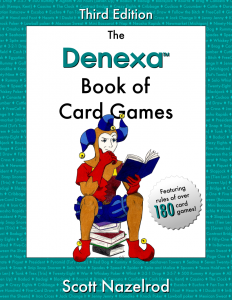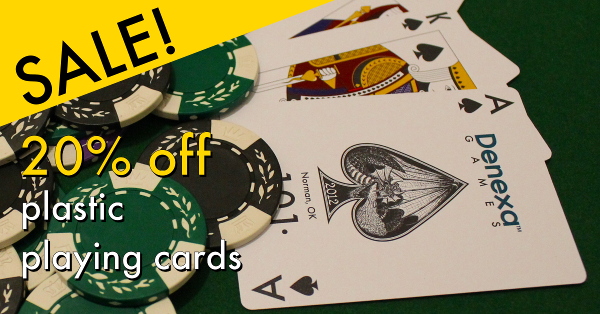Carioca (Loba)
Carioca is a rummy-type game for two to five players. It is a good example of a member of the Contract Rummy sub-group of the Rummy family. In Contract Rummy games, each player’s first meld must meet certain requirements called a “contract”, which change from hand to hand.
Carioca is mostly played by that name in Argentina, but it has been known to appear in Chile as well. In Central America, a version of the game with some variations is played under the name Loba. (There’s a game called Loba played in Argentina, but it’s not the same as Carioca.)
Object of Carioca
The object of Carioca is to score the lowest number of points by being the first to deplete your hand. Cards are disposed of by forming melds. In order to do so, the player must first make a certain combination of melds that meet the contract for the hand.
Setup
Carioca requires the use of two standard 52-card decks of playing cards, including jokers, shuffled together to make a 108-card pack. While you could use any old cards you have lying around, we know you’ll get the best results if you use Denexa 100% Plastic Playing Cards. Trust us on this one. You’ll also want something to keep score with, like pencil and paper.
Shuffle and deal eleven cards to each player, or twelve cards on the seventh and final hand of the game. Place the remainder of the deck face-down in the center of the table, forming the stock. The first card of the stock is turned face up; this card, the upcard, is the first card of the discard pile.
Game play
The player to the right of the dealer goes first. This player may draw either the current upcard or the top card of the stock. If they are able to meld any cards, they do so after melding. Finally, they discard one card, ending their turn. The next player to the right goes after that.
Melding
There are two types of melds in Carioca. One is the trio, which is three cards of the same rank. The other is the escalera, which is four cards of the same suit in sequence. Cards rank in their usual order, with aces either high or low (but not both at the same time).
Melding is subject to one big restriction: on each hand, on the first turn in which a player melds (their initial meld), they must, all at once, make the contract for the hand. The contracts for each hand are as follows:
- Two trios.
- One trio and one escalera.
- Two escaleras.
- Three trios.
- Two trios and one escalera.
- One trio and two escaleras.
- Three escaleras.
Note that on the sixth and seventh hands, meeting the contract will exhaust the player’s entire hand. On the first five hands, players will have cards left over when they make their first meld. On later turns, a player who has met the contract may extend any meld on the table with cards from their hand. That is, a player may expand a trio with more cards of the same rank, or they may add extra cards on the end or the beginning of an escalera. Any meld on the table can be expanded, whether you melded it or not.
Using jokers
Jokers are considered wild cards, and can substitute for any other card that you wish in a meld. However, when a player makes their initial meld, only one joker is allowed per meld. After making their initial meld, players may freely add as many jokers as they wish to a meld.
If there is a joker in an escalera, and you hold the natural card that it represents, you can play that card to the escalera in place of the joker. The joker then moves to either end of the meld. You can then extend the meld further from the joker, if possible.
Ending the hand
The hand ends whenever one player runs out of cards. That player wins the hand and scores zero. All other players count up the value of their deadwood (unmatched cards in hand) as follows:
- Jokers: 50 points each.
- Aces: 20 points each.
- Face cards: 10 points each.
- All other cards: Face value.
Each player’s deadwood value is their score for the hand. The deal then passes to the right for the next hand.
Whichever player has the lowest score at the end of seven hands is the winner.


